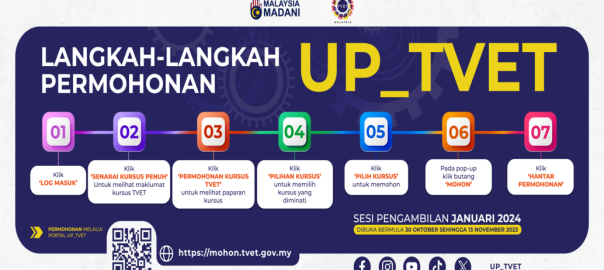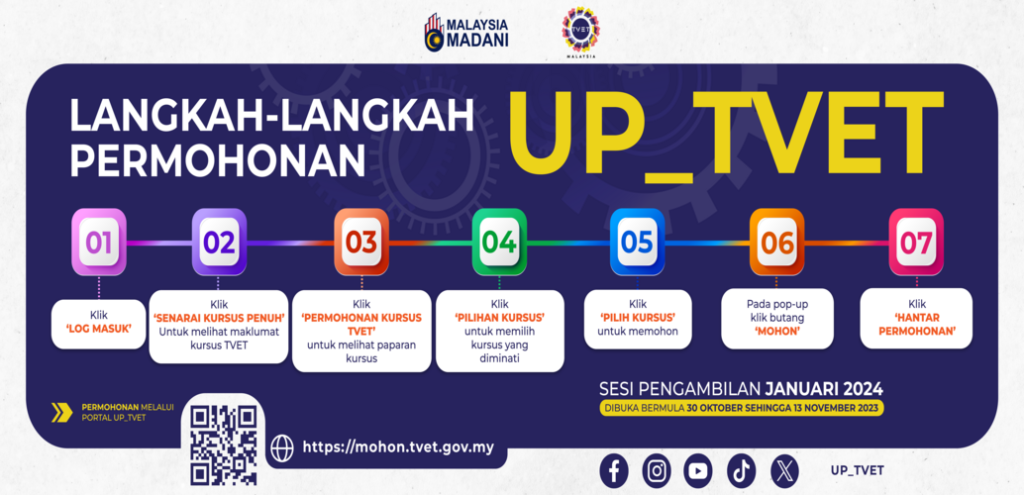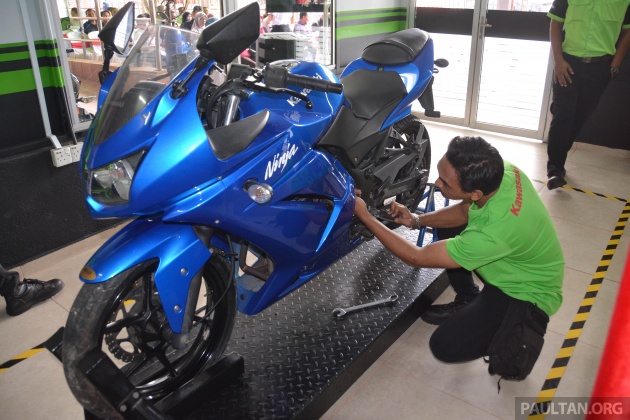The focus of Technical and Vocational Education and Training (TVET) recently received widespread attention in Malaysia, after Datuk Seri Najib Razak announced the government’s plan to develop a comprehensive TVET plan to help the future workforce in facing the Fourth Industrial Revolution.
Coined by German economist Klaus Schwab in 2015, the Fourth Industrial Revolution is used to describe the emergence of the Digital Economy and use of automation and data exchange in industrial technologies. Commonly referred to with the catchprase Industry 4.0 it also included the Internet of Things and collaboration between networked machines and human beings in decision-making.
We might not feel it in our daily lives but robots and computers are slowly replacing some traditional jobs from the last century and creeping into our daily lives in the form of smart appliances and machines with computer programmes that can learn our habits and preferences.
Technology experts are already speaking about the coming industrial revolution as one that has the potential to disrupt every industry in every country due to the exponential pace that is the nature of digital revolution which is at the heart of Industry 4.0

This is already happening in businesses and industries as robotics and artificial intelligence can take over jobs traditionally manned by human labour, in particular technical processes that can easily be computerised.
As for the Malaysian government, they are going to allocate RM 50 million from 30 % of the Human Resources Development Fund (HRDF) funds collected for the purpose of TVET, to increase competitiveness as well as improving the calibre of the workforce and the nation’s economic development.
While our nation is still in the process of streamlining vocational education to meet international standards, it also has to grapple with revamping the same fledgling TVET education structure to ensure the skills taught are not at risk of becoming obsolete.
What skills and education do TVET students need in order to ride the coming digital revolution and not risk having their expertise be replaced by a computerised machine?
To understand the importance of TVET in facing Industry 4.0, Malaysian Digest reached out to industry insiders for an insight on the matter.
Malaysia Is Lagging Behind Its Southeast Asian Neighbours In Implementing Vocational Education
Malaysian Digest interviewed Adlan Ali, an electrical engineering and TVET lecturer in Universiti Teknikal Malaysia Melaka (UTeM). He has written many papers relating to TVET education, and have collaborated with many academic institutions, private companies and government agencies relating to TVET for the past 18 years.
 Adlan Ali. Photo: UTeM“According to a report by the United Nations International Centre For Technical and Vocational Education and Training (UNEVOC), our country is still under the “awaiting validation” status. Meanwhile our neighbouring Southeast Asian countries such as Thailand, Phillipines, Indonesia, Myanmar and Cambodia have already been on the database way ahead of us,” said Adlan.
Adlan Ali. Photo: UTeM“According to a report by the United Nations International Centre For Technical and Vocational Education and Training (UNEVOC), our country is still under the “awaiting validation” status. Meanwhile our neighbouring Southeast Asian countries such as Thailand, Phillipines, Indonesia, Myanmar and Cambodia have already been on the database way ahead of us,” said Adlan.
One of the reasons why our country is lacking in structured TVET education is because currently seven ministries and almost all state governments are running it.
Adlan strongly feels that this stands in the way of proper establishment for TVET governance, which is one the requirements to be fulfilled before Malaysia can be listed on the World TVET Database.
Fortunately, the government has realised the importance of TVET education, and has included its agenda as the third core in the 11th Malaysia Plan to elevate human resources development and making TVET transformation an identified focus field.
TVET lecturers around the country also collaborated to create a structure for the TVET education.
“Starting from a small fund of research grant and a small group of individuals, we have managed to collaborate together and developed the National Occupational Skills Standard (NOSS) for TVET Lecturers, Trainers and Educators. The NOSS has been recently approved and the name of the NOSS is TVET Implementation and Development,” he said, and members of the organisation include lecturers from UTeM, UniKL, UniMAP, Malaysia Science Academy and many other agencies.
As for adapting to Industry 4.0, TVET providers have seriously reviewed their existing programme’s objectives and learning outcomes to ensure FIR is well-stated and learned.
In the case of UTeM, they have recently reviewed its academic programmes at the university level, as well as offering new academic programmes that are tailored and suited towards the FIR.
 Malaysia is yet to achieve a validated status by UNEVOC.
Malaysia is yet to achieve a validated status by UNEVOC.
In order for the government to decide which industries must be focused in the current TVET education, all ministries and state governments must work with the Ministry Of Human Resource, under the Industry Skills Committee (Jawatankuasa Kemahiran Industri – JKI) and Skills Development Department (Jabatan Pembangunan Kemahiran – JPK).
“That way, we can detect what industries are potentially booming in the country and internationally, what industries are currently lacking competent workers what level of position the industries are lacking such as managers, engineers and technicians,” opined Adlan.
Most TVET graduates will be working in small-and-medium enterprises (SMEs). However, according to the Malaysian Productivity Corporation (MPC), ICT adoption by SMEs in Malaysia is a mere 10%. This is in stark contrast to other developed countries where the adoption stands at 50%. To meet the technological demands of Industry 4.0, ICT education must be taught to TVET students as well.
“Malaysian Industrial Development Authority (MIDA) has got to be given more roles and obligations, to ensure FIR is well within reach of the SMEs and very objective to be achieved.
“The partnership / collaboration between industries – TVET institutions must be made top priority because as far as I’m concerned, the existing scenarios are not that encouraging as the industries are focusing on meeting their production target, while the TVET institutions are focusing on their ‘on-paper only’ planning,” he explained.
The key to implementing TVET education in Malaysia, according to Adlan, is awareness. Industries must support the government’s plans and aspirations, helping the workers grow, and making the country’s TVET on par with the developed countries.
“At national level, we may talk about TVET and FIR but at the production and manufacturing ground level, I believe the awareness are still below par. With the existing global economic scenarios and Malaysian currency exchange, industries tends to commit on productions cum profits rather than focusing on TVET and Industry 4.0,” he shared with Malaysian Digest.
As Adlan highlighted, looking at the big picture is one thing but what about the actual situation on the ground? Malaysian Digest looks at the measures taken by local vocational training organizations to ensure their students can be at the forefront of the coming fourth industrial revolution.
GiatMara’s Role In Enhancing Skills, Knowledge Of The Nation’s Youth
GIATMARA is a government institution providing technical and vocational skills training to youths in rural and urban areas. Their aim is to ensure the students are equipped with the valuable skills to become technical entrepreneurs and workforce in fulfilling the country’s industrial needs.
In understanding how GIATMARA is helping the youths to adapt to today’s challenges created by FIR, Malaysian Digest contacted Dato’ Arman Azha, the deputy chairman of GIATMARA.
 Dato’ Arman Azha.“GIATMARA focuses on hands-on education, rather than theory-based reading. We have 231 GIATMARA centers all over the country,” he briefed Malaysian Digest.
Dato’ Arman Azha.“GIATMARA focuses on hands-on education, rather than theory-based reading. We have 231 GIATMARA centers all over the country,” he briefed Malaysian Digest.
Before the implementation of TVET education by Datuk Seri Najib Razak two years ago, GIATMARA created 22,000 graduates annually. Out of the 22,000 graduates, only 10% will be entrepreneurs, while the rest will be working in factories and workshops.
“However, since about one year ago, we decided to teach entrepreneurship skills to our students as well. From there, we created a course called Mobilepreneur Muda (Young Mobilepreneurs) in collaboration with Minister of Rural and Regional Development,” explained Dato’ Armand, in which the aim of the programme is at least 50% of their graduates will become SME entrepreneurs.
On top of the normal vocational lessons, the qualified students under this program will receive some assistance in the form of free motorbikes to help them move around, as well as equipment related to their vocational training. More importantly, they are taught to utilise technology to promote themselves in the digital market and adapt to the challenges of FIR.
In the past, GIATMARA provided small financial assistance to its graduates in helping them adapt to the industry. However, many of them mismanaged the money, so the organisation decided to help with other form of assistance.
“Instead of providing financial assistance, this programme is much more efficient and cheaper as well. In six months, the students under the programme must show their progress after we helped them.
“If they are doing well, then the equipment and motorbike will be given to them for free. On the other hand, if they failed to utilise our assistance well, we have the right to take the motorbike back,” he explained.
 Mobilepreneur Muda intends to help vocational graduates in kickstarting their business.
Mobilepreneur Muda intends to help vocational graduates in kickstarting their business.
This year alone, the programme has helped 3,000 young TVET enterpreneurs. Other than creating new programmes, GIATMARA also revises their curriculum and creates new courses to adapt to today’s demands that are shaped by the FIR.
New courses include aircraft maintenance, heavy machine maintenance and many others that are in high demand.
GIATMARA also realises the crucial role of technology in creating successful SMEs, and students are encouraged to make full use of the technology such as social media and smartphone applications to promote their businesses.
“In facing the FIR, we are providing digital courses as well, such as online marketing and graphic design.
“GIATMARA also revises our courses from time to time to ensure our courses remain relevant with today’s technological demands,” he concluded.
Introducing TVET Education To Tahfiz Students To Prepare For Industry 4.0
 Maahad Tahfiz Vokasional Aman Bistari in Puchong.
Maahad Tahfiz Vokasional Aman Bistari in Puchong.
One of the main points in Datuk Seri Najib Razak’s recently launched TVET initiative is to introduce TVET educational to tahfiz students as value add for them, whereby besides memorising the Quran, they would also have valuable trade skills.
The initiative is highly lauded by Mohd Asri Yunus, founder and principal of Maahad Tahfiz Vokasional Aman Bistari, a group of tahfiz schools in Malaysia that teaches not only Islamic knowledge, but vocational training as well.
 Mohd Asri Yunus.“The first school was founded back in 2009. At first, we only taught culinary skills to our students. Over the years, we have expanded to nine vocational courses on top of culinary, such as sewing, calligraphy, animation, automotive repair, and farming,” explained Mohd Asri to Malaysian Digest.
Mohd Asri Yunus.“The first school was founded back in 2009. At first, we only taught culinary skills to our students. Over the years, we have expanded to nine vocational courses on top of culinary, such as sewing, calligraphy, animation, automotive repair, and farming,” explained Mohd Asri to Malaysian Digest.
While the students are learning the vocational skills, Islamic knowledge is at the core of the school’s basic education.
Maahad Tahfiz Vokasional Aman Bistari is the first vocational tahfiz center in the country, and since their inception have grown to six campuses all over Malaysia.
 Students in the culinary hall.
Students in the culinary hall.
A vocational institution graduate himself and former oil-and-gas employee, Mohd Asri was requested by the late Kelantan chief minister Tuan Guru Nik Aziz to transform traditional tahfiz center systems into a more modern system, one that teaches skills outside of religious knowledge as well.
“The syllabus that is taught in our centers is on par with the ones being taught at normal vocational institutions. Our equipment is industrial-grade, and we have spent more than RM60,000 to equip our schools.
“Even for our teachers, our tahfiz center hires industry veterans with certified qualifications and years of experience. For example, our culinary teachers are consultants to Federal Agricultural Marketing Authority (FAMA) and many universities,” he said. In the future, the tahfiz center aims to create hospitality and mold-and-die manufacturing courses.
The center takes in students up to 17 years old, and prides itself of being a tahfiz center that teaches worldly skills on top of religious knowledge.
According to Mohd Asri, students in his center are less likely to lose interest in memorising the Quran as they are also taught interesting courses in between Quranic lessons.
The skills taught to the students are designed so that once they graduate, they can immediately work in their respective fields. The culinary students of the tahfiz center run their own conventional catering service for weddings and special functions, and the sewing students also take up orders from customers outside the tahfiz center so that the students can develop their skills to be marketable.
 The students providing catering service to a special function.
The students providing catering service to a special function.
“We emphasise hands-on approach. They prepare all the foods that the students eat, and the students sewed their own clothes as well. Once the students have been with us for more than a year, they will be sent to the industry for on-the-job training.”
The center is registered under the Selangor Islamic Department (JAIS) and receives funding from the parents, corporate sponsorships and state government. Even though their education is separate from the national school system, the students can take their SPM examinations when they are 18 years old.
Mohd Asri encourages other tahfiz centers to develop vocational education as well, however he admits that creating such education is not easy.
“For one, hiring the right teachers is difficult. Many qualified individuals refuse to work with tahfiz centers, and sometimes, the tahfiz centers have issues with hiring teachers that are not of religious background.
“For me, I do not care whether the teachers are religious or not. We only employ them for their expertise, and sometimes the teachers can learn religious matters from the students as well,” he relayed to Malaysian Digest.
Other challenges include high cost of starting vocational education, but Mohd Asri has seen tahfiz centers taking their own initiatives to help their students learn much-needed vocational skills. Some centers have collaborated with their local vocational centers and community colleges to teach the tahfiz students.
Many of Aman Bistari’s graduates have found jobs or even started their own businesses thanks to the skills learned while they were in the center. Mohd Asri hopes that his center can be an example for other tahfiz centers to follow to add value to their students, and embrace the call to TVET education by Datuk Seri Najib Razak.
— Malaysian Digest











